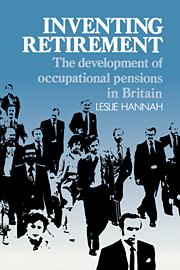Book contents
- Frontmatter
- Contents
- List of tables and figures
- Preface
- Part I The rise of pensioning
- 1 Savings, work and old age in Victorian Britain
- 2 Rival pioneers of collectivism: pensions, the state and employers (1899–1927)
- 3 The insurance challenge (1927–56)
- 4 The state: partner or competitor? (1940–78)
- 5 Competition and professionalization: the maturing of the pension market (1956–79)
- Part II The shaping of the modern pensions institution
- Epilogue: Contemporary critics and the future of pensions
- Statistical appendix
- A note on sources
- Notes
- Index
5 - Competition and professionalization: the maturing of the pension market (1956–79)
Published online by Cambridge University Press: 03 May 2010
- Frontmatter
- Contents
- List of tables and figures
- Preface
- Part I The rise of pensioning
- 1 Savings, work and old age in Victorian Britain
- 2 Rival pioneers of collectivism: pensions, the state and employers (1899–1927)
- 3 The insurance challenge (1927–56)
- 4 The state: partner or competitor? (1940–78)
- 5 Competition and professionalization: the maturing of the pension market (1956–79)
- Part II The shaping of the modern pensions institution
- Epilogue: Contemporary critics and the future of pensions
- Statistical appendix
- A note on sources
- Notes
- Index
Summary
what the market really wants is not the traditional guarantees of an insurance contract so much as a combination of technical advice, efficient investment of pension funds and a good administrative service …
Ron Peet, Legal & General manager, staff Annual Conference, privately printed, 1971, p. 15Government policy has, understandably, been a major preoccupation of the pensions interests in the post-war decades. Both the tax regime and contracting-out provisions for the earnings-related state pensions had profound effects on the coverage and shape of occupational pension schemes in that period. But the pensions institutions and the market for old age savings also had a dynamic of their own. Changes in the employment relationship, with further growth of large-scale, bureaucratic organizations and labour shortages under full employment conditions, increased the demand for pensions from both employers and employees. In the 1960s and 1970s more than a million employees were transferred from the private to the public sector, where employees were more likely to demand and get pension coverage. In private industry, too, a wave of mergers created substantially larger organizations, and this usually resulted in the adoption of pensioning in parts of the organization where it had not existed before. As the size of the pensions market expanded, other financial institutions joined the insurance companies, competing for what was becoming a rapidly growing sector of the market for personal savings.
- Type
- Chapter
- Information
- Inventing RetirementThe Development of Occupational Pensions in Britain, pp. 65 - 82Publisher: Cambridge University PressPrint publication year: 1986



